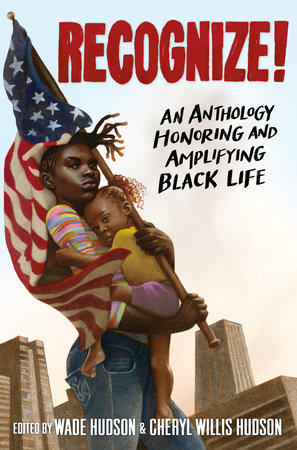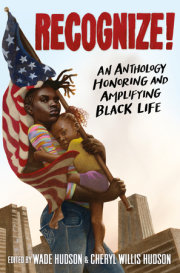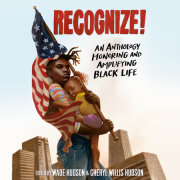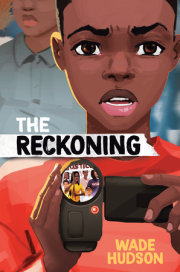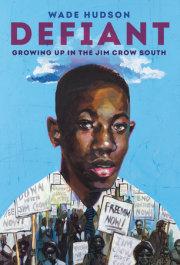Coloring Outside the Lines
Jerdine Nolen
The gift of the children’s Bible from a family friend was not new. But it had color pictures to go along with the stories. I could read. I was nine years old. I thumbed through the book. I stared at the pages. There was something about the pictures that didn’t seem right--sometimes, I think, it’s that way with hand-me-down things.
In our house, Daddy always reads the big family Bible aloud to us. He sits in his big Poppa-sized chair and we sit on the floor at his feet. His booming voice sounds like thunder--a sound just right for reading the Bible. And Daddy loves reading aloud. He is such an actor.
I especially love hearing him read Genesis. He explains what “thou sayeth,” “doth,” and “beget” this and that means. This book didn’t have any of those kinds of words. My three older sisters weren’t interested, so the book became mine.
I love all kinds of stories. Some I try to memorize, thanks to my fourth-grade teacher, Mrs. Harris, who is also a member of our church. She teaches Sunday School, usually with a map to show where things happened in the world.
We learned about people who lived close to the belt around the earth’s waist, the equator. That’s where our ancestors came from and the reason for our skin color and our type of hair--the sun is so hot there.
Whenever I get an old/new book, I sleep with it under my pillow. It makes for a bumpy night’s sleep, but that way I get to know the book. It’s a way to make the old/new book mine.
I always have lots of questions about the things I’m learning. I didn’t think my questions were hard, but it seemed most of them were unanswerable. For example, on Sunday in church we talked about Adam and Eve. Mrs. Harris told us they were the first people. Then in class on Monday Mrs. Harris showed a filmstrip on the cave dwellers that said they were the first people. I was confused. I raised my hand to ask a question. “If the cave dwellers looked as they did and Adam and Eve looked as they did, who came first? Who were the first people?”
My serious question was not meant to cause giggles. Immediately, I got Mrs. Harris’s look and pointing index finger. That meant to head for the coatroom in the back of the class. I was glad. It was quiet there. I could think.
I needed answers, even if no one was around to give them to me.
That’s when I realized what was wrong with this old/new book. The people all looked like Dick and Jane, the kids in my reading primer, or people on TV--and they were all white. Even Jesus had white skin and yellow hair. Not one of them fit what Mrs. Harris taught us about what the people living near the equator looked like. They had brown skin and dark hair.
I didn’t like the feeling growing inside me. I was feeling like I didn’t want the book anymore and I wanted to give it back. Momma and Daddy wouldn’t want me to do that. Deep down I really didn’t want to. But the pictures were all wrong. I had to do something.
If I was going to read this Bible, I had to make it readable.
Last Saturday, I got a new box of crayons and a new coloring book. I love to color. I always stay in between the lines.
There were only eight colors and the only one that came close enough to the skin color I was looking for was brown--black would hide features, so I used that for the hair.
To keep away from tattle-telling mouths, I worked on my project in the privacy of my bedroom. But this day, I decided to stretch out on the dining room table just as Daddy was walking by.
“What are you doing to that book?” He picked it up. “This book of all books! And it was a gift. . . .”
I had no words. But Daddy had a lot of them. The worst thing about his punishments were the talks.
“We’ll talk later.”
I prayed to Jesus with the Yellow Hair for almost anything but that. I hoped he’d hear me. Daddy’s lectures went on forever and sometimes into the next day. The thing was to keep a low profile, stay out of sight. All went well for a while--things quieted down, but not inside of me.
I was already in trouble. I put the book back under my pillow and waited for the house to be quiet.
I grabbed my box of crayons and the Bible and headed for the bathroom. I locked the door behind me. I wouldn’t let myself turn back. Sitting on the floor, I opened to the story with Jesus and the little children. I colored them first. Now it was Jesus’s turn. After a while, I let out a long yawn and stretched. I packed up all my things. I opened the door and bumped into my father. He was headed for the kitchen for his usual snack. Daddy looked at my hands. I looked at my feet.
What would happen to me now? Had Daddy run out of lectures for me?
“Come near to me,” he said. I followed him into the kitchen. “Show me what you were doing with your crayons and that book.” I opened my mouth and started to cry. I blurted out everything. “It’s not fair. It’s not fair! Mrs. Harris says we matter in the world but nobody in this whole book looks like us and the stories take place near the equator where people have darker colored skin like us. See? Everybody in this book looks like the people on TV. Even Jesus has yellow hair.”
“What were you doing just now?”
“I couldn’t take it, Daddy. I just couldn’t take it anymore.” I opened the book to Jesus with the No Longer Yellow Hair. “See?”
Daddy looked at the picture for a long time.
“This is what you were doing?”
I nodded. “I wanted this little girl to look like me, and Jesus . . .” I hesitated. “. . . to look like you.”
The silence between us was waiting on his answer. Then, Daddy chuckled. “He does kind of favor me.”
“And she kind of looks like me, too. Doesn’t she?”
Daddy got quiet.
“What are you thinking about?” I asked.
“Hmm . . . thinking about what you did to the book. I see why you did it. I think you had a good reason to do what you did.”
“I did.”
“Well, I guess nothing left to do than share a slice of Momma’s chocolate cake?” Suddenly, we were eating cake, looking at the pages I colored, reading and talking about the stories, and laughing.
Then, Daddy stopped reading.
“Now what?” I asked.
“I’m proud of you.” He smiled, hugging me.
“Me too,” I answered. “It’s just as Mrs. Harris said. Things like this do matter in the world.”
James Baldwin’s Great Debate
Wade Hudson
James Baldwin looked out at the sea of faces in the auditorium in Cambridge, England. Often in demand to share his views about racial injustice and the treatment of Black people in America, Baldwin was an articulate, moving, and insightful writer and spokesman. That’s why he had been invited to speak.
The Cambridge Union Society at Cambridge University had organized a debate on February 18, 1965, with the topic “The American Dream is at the expense of the American Negro.” To tackle this challenging subject, they had chosen Baldwin and William F. Buckley.
Buckley was an established magazine editor, political thinker, and founder of the conservative magazine National Review. He had made his position about racial equality and justice very clear in a 1957 National Review magazine piece entitled “Why the South Must Prevail.” In it he contended that white Southerners were entitled to “take such measures as are necessary to prevail, politically and culturally” over Black Americans.
When the Voting Rights Act of 1965 was passed, which guaranteed Black Americans the right to vote, Buckley said it would result in “chaos” and “mobocratic rule.” He also voiced his concerns about other legislation and court rulings that addressed racial segregation in the country.
Baldwin was an acclaimed novelist, essayist, civil rights leader, and political thinker. Born and raised in Harlem, New York, he once recalled, “I knew I was black, of course, but I also knew I was smart. I didn’t know how I would use my mind, or even if I could, but that was the only thing I had to use.” He began to spend much of his time in libraries, where he found his passion for writing.
Baldwin’s first novel, Go Tell It on the Mountain, was published in 1953. A semi-autobiography about a fourteen-year-old boy’s discovery of his identity during the 1930s, it became a literary classic and established him as an important voice on racial and social issues. He became involved in the civil rights movement in the 1950s and wrote many articles and essays about what was happening in the American South.
Leaders of the Cambridge Union Society felt that both men were worthy advocates for their positions. A debating and free speech organization, the Society was founded in Cambridge, England, in 1815. It had hosted prominent figures from all areas of public life, including prime ministers and other leaders of state. On this February night in 1965, the auditorium was packed.
James Baldwin spoke first. A short, thin man, he commanded the audience’s rapt attention. And as he continued to make his case, members of the audience applauded when points he made resonated with them, which was often.
“When I was growing up, I was taught in American history books that Africa had no history and neither did I,” he told them. “That I was a savage, about whom the less said the better, who had been saved by Europe and brought to America. And, of course, I believed it. I didn’t have much choice, those were the only books there were.”
Baldwin gave vivid examples of how Black Americans had been victimized by racism. He related how Black Americans had helped to build the country and had received little compensation or recognition for their work. When he finished, Baldwin received a prolonged standing ovation. The announcer said he had never seen such a reaction at those events before.
Buckley followed. An accomplished speaker, he engaged the audience with his intellect and humor. But it was obvious he was on the wrong side of history. Years later, he would change some of his views about civil rights in the United States.
When the debate ended, a vote was taken to determine the winner. Baldwin won, 544 to 164.
The United States of America and countries worldwide are still grappling with race and social justice and the points that Baldwin and Buckley debated in 1965. James Baldwin’s books and speeches continue to inspire and inform people today, especially those who are taking steps to do something about those issues.
Black Lives Have Always Mattered
Wade Hudson
Black lives matter.
Black lives have always mattered.
Our ancestors were kidnapped in Africa, forced to march hundreds of miles, shackled, and bound together.
They were imprisoned in dungeons, forced to wait for the big ships to come--slave ships that would take them on the long, perilous journey across the Atlantic.
Crowded in the hull, they were ill-fed and often beaten. Many died on the way.
Black lives mattered.
Those who survived were paraded to auction blocks in Charleston, Alexandria, and New Orleans and sold as property to the highest bidder.
They did the work, the backbreaking labor to build and grow the towns and plantations. They toiled in the fields of cotton and tobacco from sunup to sundown.
Fathers, mothers, and children were sold and separated from their families, never to see each other again.
Their tears of pain and separation were met with the whip and the lash.
Black lives mattered then, too.
That’s why so many resisted as best they could.
Harriet Tubman escaped but went back south many times, facing sure death if caught, to bring her people to freedom.
The abolitionists Frederick Douglass and Sojourner Truth dedicated their lives to break the chains of slavery.
Journalist Ida B. Wells-Barnett crusaded against the lynching of Black people in the South.
Educators Booker T. Washington started Tuskegee Institute and Dr. Mary McLeod Bethune established Bethune-Cookman when there were few schools for Black students.
The attorneys Thurgood Marshall and Constance Baker Motley went to the U.S. Supreme Court to change laws that discriminated against their people.
They all knew Black lives mattered.
Everywhere, in the North, in the South, in the East, and in the West, in towns and in cities, decade by decade, centuries long, wherever Black people were . . .
Black Lives Mattered.
When fighting in wars to support their country.
When creating the inventions that make life easier and better.
When producing the literature, music, dances, and art of our culture.
When achieving great feats in sports.
Black lives mattered.
Rosa Parks knew this was true when she refused to give up her seat on a segregated bus.
So did the civil rights leaders Fannie Lou Hamer, Martin Luther King, Jr., and Malcolm X.
Black lives mattered in 1955 when Emmett Till was murdered in Mississippi and when four little girls were killed in a Birmingham church in 1963.
Just as it mattered when Eric Garner, Trayvon Martin, Michael Brown, Tamir Rice, Sandra Bland, Breonna Taylor, and George Floyd lost their lives to white brutality and indifference.
Black lives have always mattered to Black people.
We love and hug, sing and dance, laugh and joke, tell tall tales, rap, and play our instruments.
We shout our praises in houses of worship, celebrate our achievements, push each other forward, and desire to live each day to the fullest measure!
The image of the horrible murder of George Floyd was too much for others.
Viewing callous shootings opened their eyes.
See the protest signs?
Hear the marching feet?
Listen to the chants!
Black lives matter!
Black lives matter!
Black lives matter!
Black lives will always matter!
Copyright © 2021 by Wade Hudson. All rights reserved. No part of this excerpt may be reproduced or reprinted without permission in writing from the publisher.

